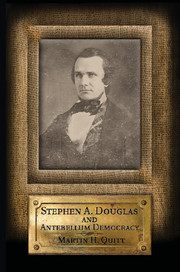Book contents
- Frontmatter
- Contents
- Acknowledgments
- Abbreviations
- Introduction
- 1 Adolescence in Vermont
- 2 Schooling, Learning, and Passing the Bar
- 3 Family Influences, Stress, and Bonds
- 4 Democratic Prodigy in Illinois
- 5 Constitutionalism, Part I
- 6 Constitutionalism, Part II
- 7 The 1860 Campaign and the Code Against Campaigning
- 8 In Lincoln’s Shadow
- 9 Douglas’s Mississippi Slaves
- Appendix Douglas’s Campaign Itinerary, 1860: June 23 to November 6
- Index
- References
4 - Democratic Prodigy in Illinois
Published online by Cambridge University Press: 05 October 2012
- Frontmatter
- Contents
- Acknowledgments
- Abbreviations
- Introduction
- 1 Adolescence in Vermont
- 2 Schooling, Learning, and Passing the Bar
- 3 Family Influences, Stress, and Bonds
- 4 Democratic Prodigy in Illinois
- 5 Constitutionalism, Part I
- 6 Constitutionalism, Part II
- 7 The 1860 Campaign and the Code Against Campaigning
- 8 In Lincoln’s Shadow
- 9 Douglas’s Mississippi Slaves
- Appendix Douglas’s Campaign Itinerary, 1860: June 23 to November 6
- Index
- References
Summary
By the inequality of civil and political rights that exists in certain parts of the Union, and the great equality that exists in others, we see the necessity of referring the true character of the institutions to those of the states, without a just understanding of which, it is impossible to obtain any general and accurate ideas of the real polity of the country.
James Fenimore Cooper (1838)In March 1834 Stephen Douglas passed his bar examination, obtained his license, opened his own law office, and gave a speech that instantly catapulted him to prominence as a Jacksonian partisan in Morgan County. He had scored as a speaker the previous winter in Winchester. Now, on March 29 at the Jacksonville courthouse, his one-hour defense of the president’s war on the national bank gained him notoriety from the anti-Jackson press. Before his twenty-first birthday, Douglas was already a man to be reckoned with in the law and politics in Illinois. Within months he became a prodigy of the new Democratic Party of Illinois – a party of young men.
Wanting financially and uncertain about his career and permanent home when he arrived in Illinois only a few months earlier, Douglas could hardly believe what he had achieved, “being less than twenty-one years of age.” Opening his law office at twenty remained a source of self-esteem. He noted it in his 1838 journal and brought it to the attention of biographers. What would have taken ten years to attain in the graded legal system of New York he had now accomplished “as an attorney and counsellor at law and Soliciter in chancery under the most favorable auspices.”
- Type
- Chapter
- Information
- Stephen A. Douglas and Antebellum Democracy , pp. 65 - 86Publisher: Cambridge University PressPrint publication year: 2012



